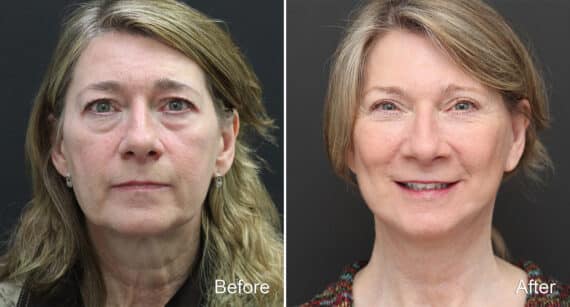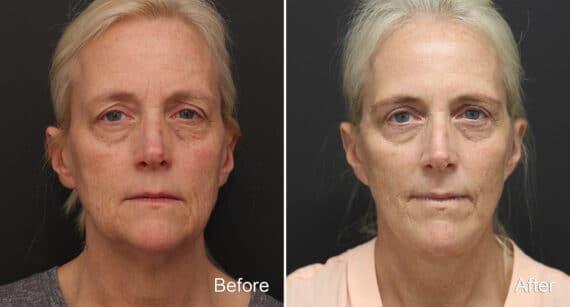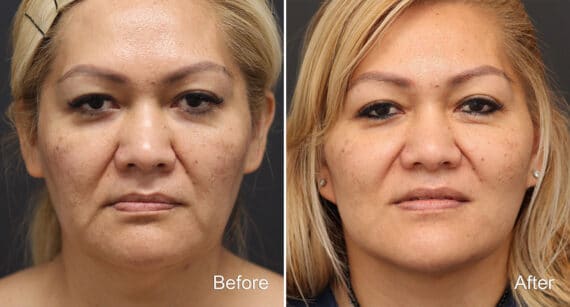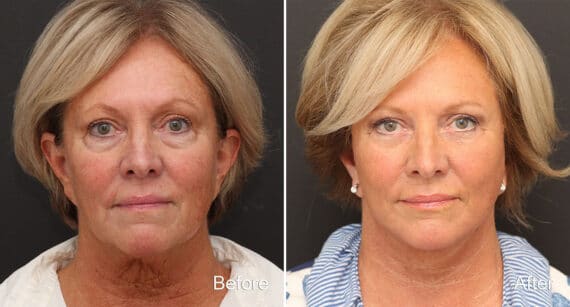Banish Tired Eyes with Blepharoplasty Benefits
Blepharoplasty is the gateway to rejuvenated eyes, transcending age and fatigue. This delicate procedure offers a refreshed gaze, symbolizing vitality and youth. Step into the transformative journey, unveiling eyes that not only see but are truly seen.

What is Blepharoplasty (Eyelid Surgery)?
The blepharoplasty procedure addresses the common problems of drooping skin and “bags” in the upper and lower eyelids.
Above the eye, sagging eyelid skin above the crease is tightened while excess fat tissue is removed and weak muscles are tightened through blepharoplasty in New Jersey. This creates tighter skin and more youthful contours in the eye area, making you look more alert and improving your vision.
Below the eye, fat that has accumulated over time to create a puffy look will be removed or redistributed and the skin will be tightened.
This pocket of under-eye fat can be hard to deal with as your skin ages and weakens, but surgery is an effective solution.
Once removed, the skin between your cheekbones and eyes will be smoother and less obvious. When you look in a mirror, you will see bright, alert, and youthful eyes, free of dark circles under the eyes and without all the excess drooping and bulging around them. Blepharoplasty patients can choose to have their plastic surgeon address the upper or lower eyelids alone, or both together in the same surgery.
Benefits of Blepharoplasty
Blepharoplasty offers numerous advantages for those seeking to enhance their facial harmony and overall aesthetic goals. By addressing loose skin and puffiness around the eyes, this surgical procedure rejuvenates your appearance, making you look more rested and vibrant. Additionally, the improvement in your field of vision, particularly peripheral vision, can enhance your quality of life, allowing you to engage in daily activities without obstruction.
Furthermore, eyelid surgery patients often experience a significant boost in self-confidence. The refreshed and youthful look that blepharoplasty provides can transform not only your appearance but also your outlook on life. This treatment option is ideal for those who are tired of dealing with a constant tired appearance and want to make a positive change.
Who is an Ideal Candidate?
Ideal candidates for blepharoplasty are individuals who are in good overall health and have realistic expectations about the outcomes of the surgery. Those who experience drooping eyelids, excess skin, or bags under their eyes that contribute to a tired or aged look can benefit greatly from this procedure. If your daily activities are hindered by obstructed vision due to sagging eyelids, you may be an excellent candidate for eyelid surgery.
Candidates should also consider their surgical goals and discuss them thoroughly with their surgeon. A successful consultation will help determine if blepharoplasty aligns with your aesthetic goals and whether the eyelid surgery technique proposed is suitable for you. Being informed and prepared is key to achieving the best possible results.
Patient Results
Hundreds of satisfied patients
* All patients are unique and individual results may vary.

How is Blepharoplasty Performed?
Eyelid surgery is an outpatient procedure. Some procedures require only local anesthesia, while more in-depth eyelid surgeries call for added sedation or even general anesthesia. Your surgeon will create a surgical plan with you before the day of the procedure.
Eyelid surgery requires finesse and skill and should only be performed by a board-certified plastic surgeon. Here’s how each type of blepharoplasty is performed:
Upper Blepharoplasty Procedure
During upper blepharoplasty, a small incision is made in the eyelid crease. Fatty tissue in the skin above the eyelid is removed, muscles are tightened, and excess skin is cut away.
Lower Blepharoplasty Procedure
There will be an incision made in the tiny crease just under your lower lashes or inside the lid. From this opening, the fatty tissue that has accumulated will be addressed and excess skin will be cut away as well.
Eyelid Surgery Recovery
Prepare to take around two weeks off after your surgery. You will need to avoid makeup initially to prevent infection and reduce the chances of developing visible scarring. In the first few days after your surgery, you’ll want to focus on rest and use pain and anti-inflammation meds as directed. You’ll also need to use cold compresses to keep swelling under control.
To prepare for your recovery, make sure that you:
- Have someone staying with you or checking on you if you live alone
- Can lie down comfortably on your back with your head elevated
- Have access to cold compresses to reduce swelling after blepharoplasty
- Avoid eye strain
- Avoid alcohol
Compresses are key to managing post-surgical discomfort and inflammation. Because you will have stitches around your eyes, you’ll want to build your cold compress from a lint-free cloth and a bag of something frozen, such as frozen peas.
When your hands are clean, wrap the frozen peas in the cloth and place them over your eyes. You can dampen the cloth only as directed by your doctor; adding water to your incision may not be the best choice early on. Your surgeon should give you detailed aftercare information to avoid possible scars from blepharoplasty or eye pressure.
No matter how you choose to manage your inflammation, do not:
- Use a warm compress; it will just increase the inflammation
- Ice your eyes for more than 20 minutes
Frostbite is possible when applying ice, so be careful. Use a timer to make sure you don’t fall asleep under your compress.
Risks and Side Effects
As with any surgical procedure, blepharoplasty comes with its own set of risks and potential side effects. Eyelid surgery patients need to be aware of these before undergoing the treatment. Common side effects include temporary discomfort, swelling, and bruising, which are part of the normal healing process. Your surgeon will provide detailed aftercare instructions to help manage these symptoms effectively.
There are also some risks associated with blepharoplasty, such as infection, scarring, or issues with the eyelid’s natural movement. Strenuous activities should be avoided during the recovery period to minimize complications. Discussing these risks with your surgeon will help you understand the precautions needed to ensure a smooth recovery and satisfactory outcome.
Things to Consider Before Your Eyelid Surgery Consultation
Eyelid surgery may be something that you’ve wanted for a long time, and you deserve to be proud of your appearance. Getting the best results possible starts with a consultation. Come to your consultation for blepharoplasty in New Jersey ready to talk about your goals, health history, and any questions or concerns you may have.
Make sure that you bring your surgeon a list of all your current medications to avoid any excessive risk during the procedure. You may need to stop some medications prior to your procedure and avoid them for the first few days or weeks of recovery time. Discuss this with your regular physician as well, if possible.
The consultation is an opportunity for you to get to know your surgeon, find out more about the procedure, and understand your own candidacy. Make the most of your consultation by asking lots of questions!
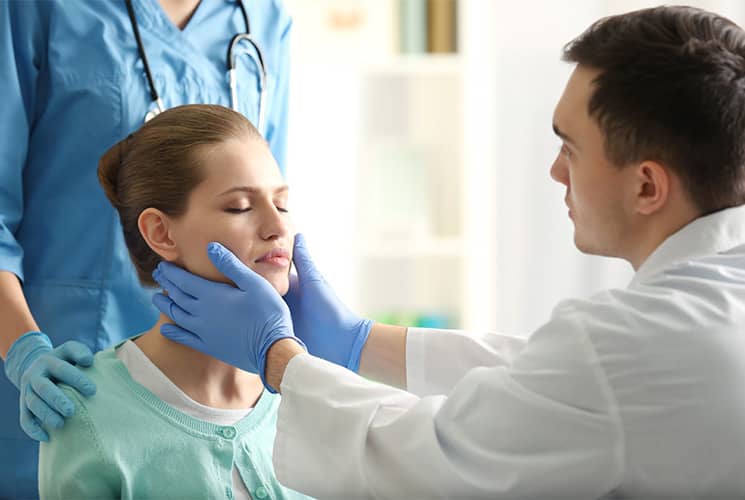

Patient Reviews
Alternative and Complementary Procedures to Blepharoplasty
Perhaps you’re interested in eyelid surgery but aren’t ready to commit to permanent correction, or surgery just isn’t in the budget yet. You might still be able to get terrific results at the Becker offices in Princeton, Voorhees, Yardley, and Philadelphia with other therapies. For example, you could undergo skin microneedling, which is non-invasive and boosts collagen production. This tightens the skin and improves the tone. It can also reduce the appearance of dark circles.
If your under-eye concerns aren’t bags but hollows, an injectable filler could be enough to smooth out the area under the eyes and leave you looking more well-rested. Finally, if brow wrinkles are a point of concern, consider using Botox to relax the brow line and stop the downward pull on aging skin.
Why choose the Doctors at Becker Plastic Surgery

Kirk Lozada, MD, FACS
- Completed his fellowship at the University of Pennsylvania and has trained with the top Facial Plastic Surgeons in Philadelphia, New York, and New Jersey.
- Has traveled to Ica, Peru with Healing the Children on multiple occasions performing a high volume of cleft lip and palate surgery.
- Is currently a member of the American Academy of Facial Plastic & Reconstructive Surgery and has numerous publications and presentations in the field of facial plastic surgery.
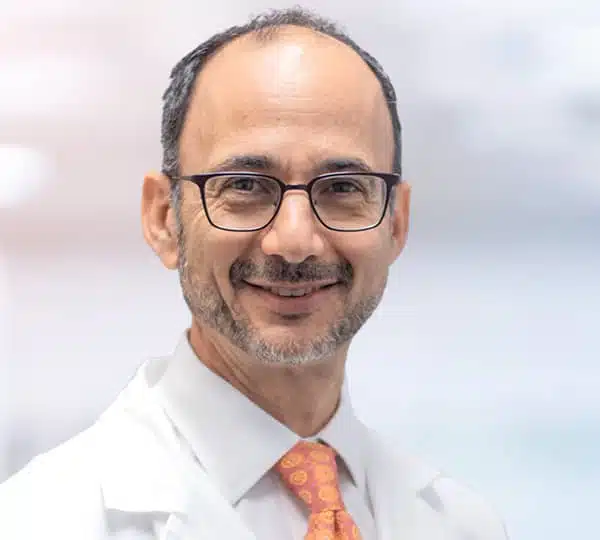
Daniel Becker, MD, FACS
- Board Certified by the American Board of Otolaryngology (ENT).
- Board Certified by the American Board of Facial Plastic and Reconstructive Surgery (ABFPRS).
- Fellow of the American College of Surgeons (FACS).
- Top-Rated by US News and World Report, Philadelphia Magazine, South Jersey Magazine, Castle-Connelly, and others.
- Read more about rhinoplasty specialist Dr. Becker’s credentials

Nicole Schrader, MD, FACS
- She is a double board certified surgeon in Facial Plastic and Reconstructive Surgery and Otolaryngology & Head/Neck Surgery.
- Is a member of the American Academy of Facial Plastic and Reconstructive Surgery
- Has over 20 years of experience, 15+ years in private practice and has performed hundreds of facelift surgeries.
- Dr. Schrader Recognized as Best Plastic Surgeon by Town Topics Readers’ Choice Awards.

Pick one of our 6 convenient locations
for Your Plastic Surgery Needs
Common Eyelid Surgery Questions
You should have someone drive you to your Philadelphia appointment for eyelid surgery as you will not be able to drive home. Additionally, you should plan to have someone stay with you at your home if you live alone for the first few days. You may need help and you shouldn’t exert yourself too much.
Be ready to go bare-faced for at least two weeks. Don’t work makeup into your scars. After two weeks, you can use makeup to reduce the appearance of any residual bruising.
The surgical site will be carefully cleaned before your procedure, but try to come in bare-faced if possible.
You can expect swelling for the first week and bruising for about two weeks total. Make sure that you put your post-op instructions somewhere that you and your helper can easily review them. Use the medications and cold compresses as instructed. Time your cooling sessions carefully!
If you live in the states of Pennsylvania or New Jersey, Becker Plastic Surgery offers blepharoplasty and brow lift among its services. For a full list of services, please visit our Locations page.



